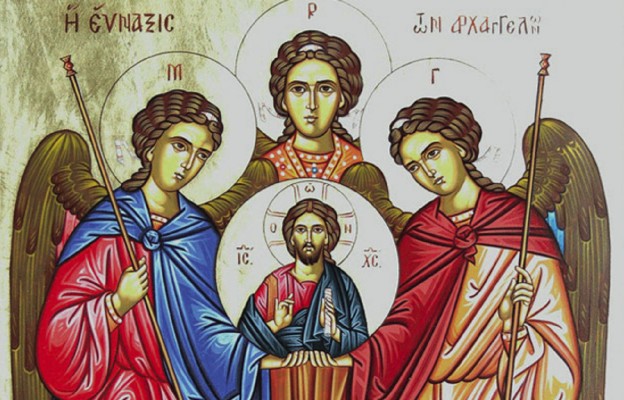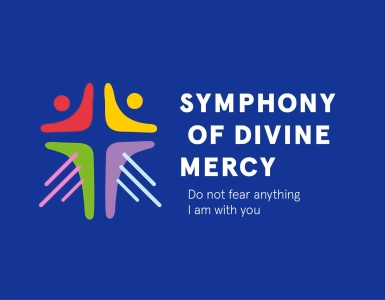The three archangels whom the Church honors by name are St. Michael, St. Gabriel, and St. Raphael. They are also the only three angels who are mentioned by name in Sacred Scripture. The Feast of all three Archangels is September 29. In the traditional calendar this was St. Michael’s feast day, with St. Gabriel’s being March 24th (the day prior to the Annunciation) and St. Raphael’s being October 24th. Communities which celebrate the Extraordinary Form of the Roman Rite still celebrate the three feasts.
“The battle against the devil, which is the principal task of Saint Michael the Archangel, is still being fought today, because the devil is still alive and active in the world.” – Pope St. John Paul II
The Book of Daniel mentions two archangels: Michael and Gabriel. In this Old Testament book, St. Gabriel interprets Daniel’s visions.
However, St. Gabriel is best known for his role in the New Testament. Zechariah, a Jewish priest, and his wife Elizabeth had been unable to have children, and Elizabeth was well beyond childbearing years. St. Gabriel approached Zechariah while the priest was burning incense in the temple. The angel said, “Do not be afraid, Zechariah, for your prayer is heard, and your wife Elizabeth will bear you a son, and you shall call his name John” (Luke 1:13). However, Zechariah doubted his words. In response, the archangel said, “I am Gabriel, who stand in the presence of God; and I was sent to speak to you, and to bring you this good news. And behold, you will be silent and unable to speak until the day that these things come to pass, because you did not believe my words, which will be fulfilled in their time” (Luke 1:19-20). This child who was born to Zechariah and Elizabeth was St. John the Baptist.
St. Gabriel also appeared to Mary at the Annunciation:
In the sixth month the angel Gabriel was sent from God to a city of Galilee named Nazareth, to a virgin betrothed to a man whose name was Joseph, of the house of David; and the virgin’s name was Mary. And he came to her and said, “Hail, full of grace, the Lord is with you!” But she was greatly troubled at the saying, and considered in her mind what sort of greeting this might be. And the angel said to her, “Do not be afraid, Mary, for you have found favor with God. And behold, you will conceive in your womb and bear a son, and you shall call his name Jesus.
He will be great, and will be called the Son of the Most High; and the Lord God will give to him the throne of his father David, and he will reign over the house of Jacob for ever; and of his kingdom there will be no end.”
And Mary said to the angel, “How can this be, since I have no husband?” And the angel said to her,“The Holy Spirit will come upon you, and the power of the Most High will overshadow you; therefore the child to be born will be called holy, the Son of God. And behold, your kinswoman Elizabeth in her old age has also conceived a son; and this is the sixth month with her who was called barren. For with God nothing will be impossible.” And Mary said, “Behold, I am the handmaid of the Lord; let it be to me according to your word.” And the angel departed from her (Luke 1:26-38).
St. Michael is mentioned several times in the Bible. He is first mentioned in the Book of Daniel where he is called “one of the chief princes” (Daniel 10:13). In the Book of Jude, he is specifically called an archangel.
The Book of Revelation says:
Now war arose in heaven, Michael and his angels fighting against the dragon; and the dragon and his angels fought, but they were defeated and there was no longer any place for them in heaven. And the great dragon was thrown down, that ancient serpent, who is called the Devil and Satan, the deceiver of the whole world—he was thrown down to the earth, and his angels were thrown down with him. (Revelation 12:7-9)
In each reference, St. Michael is acknowledged as a warrior saint who battles evil, as well as a chief angel (archangel) responsible for other angels (understood as a portion of the ninth choir angels).
St. John Paul II said, “Finally, the third archangel is called Raphael. ‘Rafa-EL’ means: ‘God heals.’ He is made known to us by the story of Tobias in the Old Testament, which is so significant for what it says about entrusting to the angels the little children of God, who are always in need of custody, care, and protection.”
In the book of Tobit, one of the deuterocanonical books of the Bible, St. Raphael travels with a man named Tobias, with the archangel presenting himself as Tobias’ relative. St. Raphael eventually helps Tobias in two ways. First, he releases a young woman, Sarah, from spiritual bondage. She was married seven times, and a demon killed each husband on their wedding night. Tobias eventually marries Sarah, with St. Raphael’s help. Also, St. Raphael helps restore the sight of Tobias’ father, Tobit, who had become blind.
EWTN





